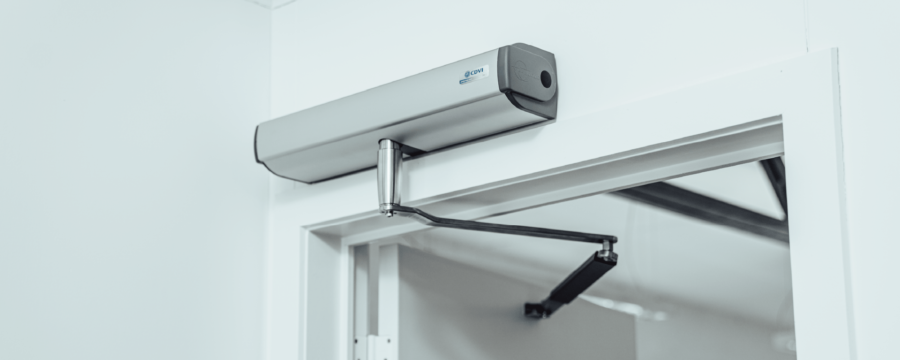What is door automation?
Door automation is a means of mechanically opening a door without the user needing to make contact with the door. Automatic doors don’t need a handle to be pushed or pulled in order to open them. They are triggered by other means. In some cases, a sensor might automatically trigger the door to open when it detects an approaching person. In other cases, the user might need to scan a card, input a code into a keypad, or present another type of credential in order to make the door open.
Door automation in schools, colleges, and universities
In educational settings, doors and entryways are very important. They are the first line of security for the building or buildings on the site. Everybody enters the school, college, or university using a door. They also delineate certain protected areas, and mark both metaphorical and physical barriers. The door to a classroom, when closed, signifies that the room inside is a place for learning and focusing.

How door automation improves education facilities
1. Better security throughout the site
Automated doors are almost always installed in combination with an electronic locking system. Often this will consist of an electro-magnetic lock, but could also be an electric strike or electric lock. One of the key benefits of electronic locking is that it reduces the risk of human error in the security process. With a manual lock and key, a person could forget to lock a door at the end of the day. Electronic locks don’t require the same manual input.
Automated doors and electronic locks can also often be monitored according to their status. When used in conjunction with a centralised online access control system, security officers can monitor the entire site from one location. Better visibility for premises officers means better security. They know what’s going on at every point of access around the site. Any security breaches or incidents can be identified, monitored, and responded to more quickly and more effectively.
2. Better mobility for everyone
Schools, colleges, and universities are busy, high traffic sites. Hundreds, if not thousands of people come to the site every day. There are regular points throughout the day when huge numbers of people must move around from place to place within the building or site. Mobility is therefore essential. The flows of traffic around the site must be as simple and smooth as possible. When there are too many people trying to move in different directions through the same spaces, dangerous crushes can occur.
Door automation improves site mobility by reducing the need for manual efforts to open doors. The few seconds it takes a person to open a door manually can contribute to serious pedestrian traffic jams when repeated hundreds of times. If doors are already open when a person approaches, the overall flow of the crowd through that point is much smoother, safer, and easier.
3. Better accessibility and inclusion
Busy educational facilities can be difficult enough to navigate and move around for able-bodied people. For people with limited mobility or those who use mobility aids such as wheelchairs and walking frames, it can be almost impossible. Schools and universities are for everybody. Their physical environments should be as welcoming as their classrooms and learning communities.
Automatic doors make life easier for people with less mobility. Automatically triggered doors, or those triggered by easy-access buttons or other devices can help enormously. Being able to get into a building and move around it smoothly and efficiently gives people greater independence and greater control. In less accessible buildings, a wheelchair user may need to leave lessons earlier or later than most other people in order to avoid overly busy corridors – interrupting and shortening their learning time. Automatic doors are a small factor that can have a big impact on people’s lives.
The DIGIWAY door automation solution
DIGIWAY is a door automation solution for single and double swing doors. It offers full customisation options and is flexible for a wide range of projects. The 26-bit Wiegand output makes it easy to integrate DIGIWAY door operators with access control systems for greater visibility and control. Door operation is smooth, sleek, and discreet.
The operators are fully compliant with EN16005 safety regulations. They are also available in kits, along with safety sensors and signage, to help installers ensure each project is compliant.
Complete automation solutions
DIGIWAY door automation works in tandem with a wide range of access solutions and ancillary products. From traditional swipe card readers to fingerprint and facial recognition, the door operators sit at the heart of convenient entry solutions. All CDVI solutions are designed to work together to create complete systems.
Online access control such as ATRIUM works with DIGIWAY when a fixed database of users is required. Each user is assigned a profile and a set of access permissions dictating where they can and can’t access. For schools, that might mean that only the finance team can enter the finance office, or only the caretakers can enter the building during night hours.
Biometrics such as ievo fingerprint readers and facial recognition solutions add an extra layer of security to door automation in schools, colleges, and universities. Where a traditional swipe card could be lost, damaged, or stolen for illicit purposes, biometric data is much more robust. Fingerprints and facial features data are extremely difficult to clone or steal. Biometrics therefore ensures that only the authorised individuals can gain access to restricted rooms or areas.
